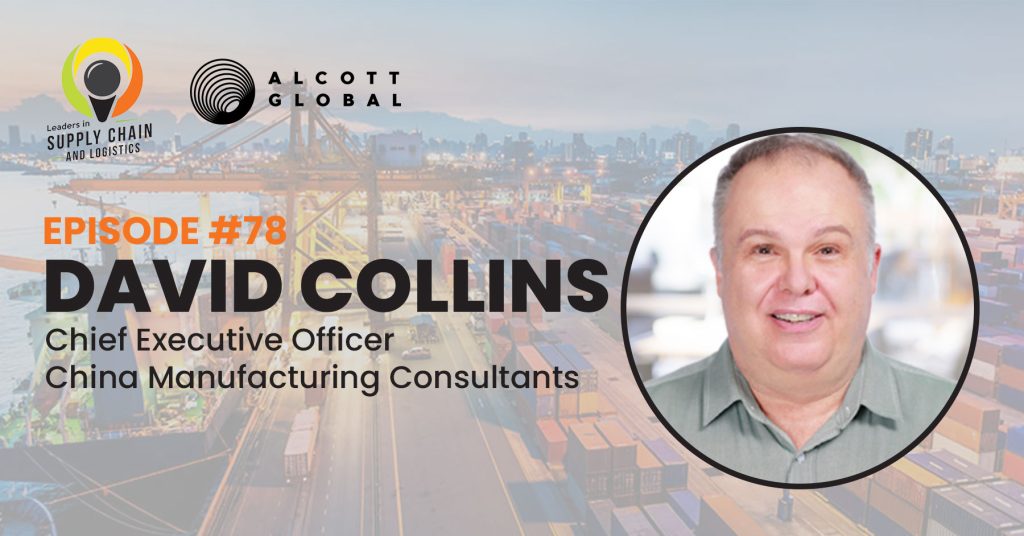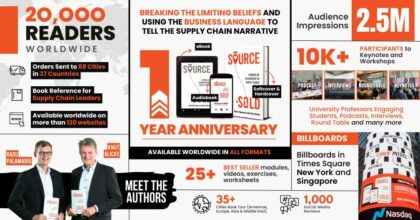David Collins is the CEO of China Manufacturing Consultants. David brings 35+ years of manufacturing experience in computer, automotive, aerospace, furniture, and chemical industries. He has worked for General Motors and Chrysler, as well as Foxconn and Jabil. Build and managed several automotive plants in North America. Successfully turned around Foxconn’s Mexico plant in the middle of the swine flu crisis 2009-2010. And for the last 10 years, he has been living in China
China Manufacturing Consultants (CMC) is a manufacturing consulting firm that advises on and executes manufacturing initiatives from the boardroom to the shop floor, with clients across industries, including Shell, Ikea, ThyssenKrupp, or Apple.
Listen to the full discussion here:
Connect with the Guest:
David Collins: LinkedIn
Some of the highlights from the podcast:
- How manufacturers deal with the supply and demand crisis
- People won’t buy cars or planes too soon. What can the industry do?
- How did companies in China resume manufacturing: dos and donts
- Take care of your suppliers otherwise, you can’t make your product.
- How to keep the factory running during a pandemic
Show Notes:
- [02:07] Tell us a bit about the current reality in China from a manufacturing perspective – in the last months, from the supply crisis and now the demand crisis. What is the impact of this on your clients
- [05:26] Wuhan was a big area for the automobile and aerospace industry, and they just started opening up last week, so some companies from the industry may start producing again in the next 2 to 3 weeks
- [07:14] I see an issue on the demand side for the automobile and aerospace industry. I don’t see people buying cars at the moment. Do you see this hitting the companies in the industry?
- [11:38] From what you have observed in China for the last 4 to 8 weeks, coming back to some level of normality, which they’ve done it quite well. What are some positive or good case studies of how to do that properly?
- [16:38] That factory that supplies you important parts is just as important as your own factory and I don’t think a lot of people consider that.
- [16:47] Financial element is also very important and there is a potential issue in regards to it, what’s your view on this?
- [19:47] People need to understand that the supply chain, and especially the extended supply chain, is you. They’re parts of your parts. They’re part that goes into your product, and they’re finances of your finances.
- [22:47] How do you see companies leaving and accelerating the departure of their manufacturing from China?
- [25:26] If you want to leave China, do it for the right business reasons. China is important to us, so we’re staying for that reason.
- [30:12] Can you share some tips and tricks of what to and what not to do to keep the business running? Of course, you don’t want people getting infected, maybe give us your top 3 or 4 tips and tricks.
- [35:38] Give people the opportunity, give them goals and objectives and they will do the work. So that’s basically what we did. We just really tried to take care of the people.
About the Host:
The host, Radu Palamariu is the co-author of “From Source to Sold – Stories of Leadership in Supply Chain”. He has been named one of the top 3 Global Supply Chain Influencers on LinkedIn and was featured in Forbes, Bloomberg, WEF, Bangkok Post, and MIT Supply Chain Talent magazine. Radu invites executives to share stories and perspectives around technology, logistics, e-commerce, supply chain, and manufacturing, and their views on how the future will look.
Alcott Global connects and upgrades the supply chain ecosystem by finding the right talent through executive search, developing talent through learning solutions, and meeting supply chain technology needs through a comprehensive crunch base marketplace.
The supply chain executive search has been our focus since the very beginning, offering recruitment services for top-tier supply chain roles at every level of the end-to-end supply chain: plan, source / procure, make, and deliver. Our consultants have years of experience in placing top talent, in North America, LATAM, Europe, the Middle East & Africa, and APAC, and besides speed, one of our biggest strengths is our network within the supply chain industry, and we capitalize on it to find the best solutions.
Through the years, we have grown as an organization and our offerings with it. One of our initiatives, the learning solutions- training and supply chain academy, is focused on transforming leadership- self-leadership, executive presence, influence capital, and business acumen. Through Supplify, we aim to match corporations with the top technology companies to solve their supply chain and logistics challenges with a focus on innovation and digital transformation.
We are in constant touch with the leaders in supply chain, inviting them to inspire the supply chain professionals in thought-provoking podcast episodes and events, and showcasing what is possible at the yearly Leaders in Supply Chain Awards.
Related Episodes:
#61: Lidia Yan CEO And Co-Founder Of Next Trucking
#74: Ken Allen Board Member Of Deutsche Post And CEO Of DHL eCommerce








